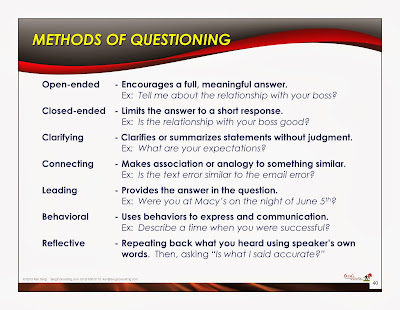
Managers and leaders
can easily improve performance by 70% when using a few basic coaching principles
with employees instead of the traditional management or communication style. Particularly with annual performance reviews, re-framing your conversation can also improve communication by 72%, and team effectiveness
by 51%, relationships by 73%, time management by 57%, in addition to satisfaction and return on investment by 86%. If you invest a lot of time or
energy managing your employees, then the coaching approach can make your job
significantly easier while simultaneously improving performance and
satisfaction.
Coaching is a much more powerful conversation
that helps employees create solutions through the skilled use of challenging
questions and action-oriented planning.
It can be spontaneous to a specific situation or a structured long-term
development plan with accountability.
Click here to read more about ‘What is Coaching?'
Although coaching is a skilled profession, there are some fundamental principles and questions you can use to elevate your competency to make your conversations much more influential and effective.
FUTURE-ORIENTED AND POSITIVE
Regardless if your conversation is spontaneous or scheduled as part of a long-term plan, issues and goals should be solution-oriented. The approach is how to move forward in a positive way. A simple example: "I want to be better organized" versus "I want to be less disorganized." Another Example: "I want to be more happy" versus "...less angry."
REPHRASING "WHY" QUESTIONS
>Why did you do that? Say instead --> What were you hoping to gain?
>Why did you tell her that? Say instead --> How did that work out for you?
>Why are you going to analyze it for the third time? Say instead --> How will running a third analyses increase your confidence in the number?
Although coaching is a skilled profession, there are some fundamental principles and questions you can use to elevate your competency to make your conversations much more influential and effective.
- The best coaching approach asks questions to facilitate the coachee solving their own problems.
- Coaching engages active listening with a variety of questioning styles.
- Coaching is future-oriented and positive.
- Coach the person, not the problem.
Regardless if your conversation is spontaneous or scheduled as part of a long-term plan, issues and goals should be solution-oriented. The approach is how to move forward in a positive way. A simple example: "I want to be better organized" versus "I want to be less disorganized." Another Example: "I want to be more happy" versus "...less angry."
REPHRASING "WHY" QUESTIONS
>Why did you do that? Say instead --> What were you hoping to gain?
>Why did you tell her that? Say instead --> How did that work out for you?
>Why are you going to analyze it for the third time? Say instead --> How will running a third analyses increase your confidence in the number?
EXAMPLES
EMPLOYEE MIGHT SAY
|
TYPICAL MANAGER
RESPONSE
|
COACHING QUESTION
|
The meeting was a disaster (blah blah blah details)
|
What happened? Did you have the hand-outs?
|
How do you want your meetings to run? What do you need to do
differently?
|
I can't believe I let her get to me like that!
|
What did she say when you...? Why didn't you tell her...?
|
How would you like it to be when she's like that? What do you
need to do to keep calm next time?
|
A critical competency of effective conversations is Active Listening. It is the ability to focus completely on what the speaker is saying and is not saying, to understand the meaning of what is said in the context of the speaker's desires, and to support the speaker's self-expression without judgment.
EXAMPLES OF QUESTIONS
Open-Ended
"Tell me about the relationship with..."
"How are you feeling today"
"How would you define success"
Closed-Ended
"Is the relationship with your boss good?"
"Are you feeling better today?"
"Is that your final answer?"
"Is that your final answer?"
Clarifying
"What are you expectations?"
"What did you mean when you said...?"
"Could you please repeat?"
"How did you know that you were being successful?"
Connecting: "Is the text error similar to the email error?"
Leading: "Were you at Macy's on the night of June 5th?"
Behavioral: "Describe a time when you were successful?"
Reflective: "I heard you say... is what I said accurate?"
ASKING QUESTIONS THAT CHALLENGE
"What if the opposite were true?"
"Why would you want to do that?"
"What if you were able to ....(do or feel the opposite / positive)?"
OTHER EXAMPLES OF COACHING-TYPE QUESTIONS
These examples are from SocialMedia.com
"What if you were able to ....(do or feel the opposite / positive)?"
OTHER EXAMPLES OF COACHING-TYPE QUESTIONS
These examples are from SocialMedia.com
-What is the outcome you’re looking to achieve
here?
-What have you tried so far?
-What haven’t you tried so far? What’s another solution/approach that may work?
-How have you handled something like this before? (What was the outcome?)
-What’s the first thing you need to do to
(resolve/achieve this)?-What have you tried so far?
-What haven’t you tried so far? What’s another solution/approach that may work?
-How have you handled something like this before? (What was the outcome?)
-What
resources do you need? (Who else do you think needs to be involved in this? How
else can I support you?)
-What are you willing to commit to doing/trying/changing (by when)?
-When should we reconnect on this to ensure you achieved the result you want?
-What are you willing to commit to doing/trying/changing (by when)?
-When should we reconnect on this to ensure you achieved the result you want?


